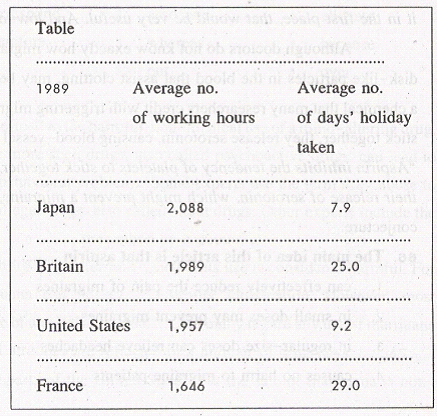Directions : Read the following texts and choose the best alternative for each question. (1-8)
Managers in Japan used to be shocked by the strange young employees they called shinjinrui (new mankind). A shinjinrui is more direct that the traditional Japanese. He acts almost like a westerner, a gaijin. He does not live for the company, and will move on if he gets the offer of a better job. He is not keen on overtime, especially if he has a date with a girl. He has his own plans for his free time, and they may not include drinking or playing golf with the boss. All pretty wild stuff a few years back, but these days managers accept that the life of a shinjinrui has much to offer.
The Keidanran, and employers’ club whose membership includes some of Japans most powerful bosses, recently published the results of a survey into attitudes to work. Only 3% of the 250 business managers questioned were in favour of some traditional practices associated with job security and a guaranteed level of pay. These practices include long hours and transferring employees to new posts where they may be separated from their families. The vast majority of those questioned said that efforts should be made to reduce working hours and that personal freedom should be respected.
Japan is embarrassed by the international attention given to Japanese working conditions. In 1987 it reduced the number of hours that may be legally worked from 48 per week to 46. Eventually Japan hopes for a 40-hour working week. But enforcement of the law is less than zealous. The labour ministry wants to get the support of employers for a wide-ranging plan that includes a five-day working week, paid holidays (which would actually be taken) and less overtime. Under this scheme the number of working hours would be lowered to 1,800 hours a years by 1992. Japanese workers at present work more than 2,000 hours a year, and no more than 40%. Japanese workers at present work more than 2,000 hours a year, and no more than 40%, mainly in big firms, have Saturday off.
Before getting too excited, consider the case of Hideyuki Tanake. In 1967 he was sacked by Hitachi, the electronics giant, because he refused to do overtime. His case against the company eventually reached the Supreme Court. It has ruled that employees are obliged to work overtime, even against their will, if the request is reasonable. In Japan the pace of change or even of no change can be slow.
The best title for this passage is……..
